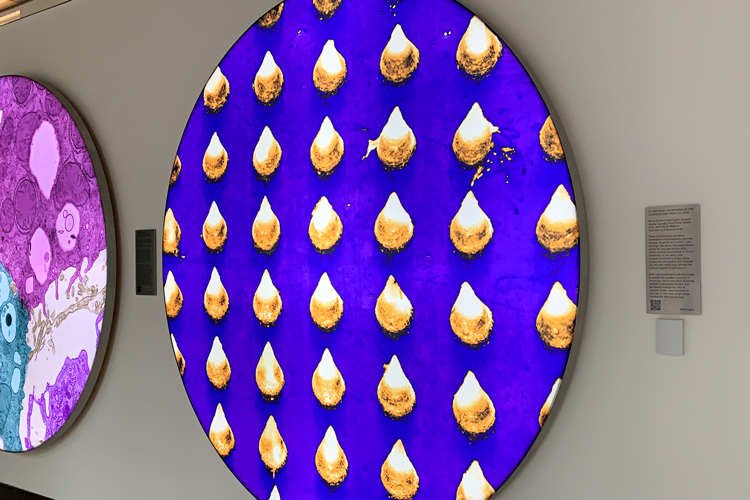Núria Puigmal and Gonzalo Muñoz, IQS doctoral students in Bioengineering, and IQS alumnus Pere Dosta, PhD in Bioengineering, have won the MIT 2021 Koch Institute Image Awards.

Photo awarded at the 2021 KI Image Awards
Núria Puigmal and Gonzalo Muñoz, IQS doctoral students in Bioengineering, and IQS alumnus Pere Dosta, PhD in Bioengineering, have won the MIT 2021 Koch Institute Image Awards.
Up to 10 images are chosen each year and displayed in the gallery at the Koch Institute, MIT's largest cancer research institute. The images are printed to a size of more than two meters and remain in the gallery for one year. Images with high scientific and aesthetic quality are awarded.
The award-winning photo was taken with a microscope of a patch of microneedles, each only 500 microns long, so they are not long enough to touch nerve endings and are therefore painless.
At the same time, the length of 500 microns enables the microneedles to pass through the outermost layer of the skin and release the drugs, which would have to be injected with normal needles without this technology. The microneedles are designed with a polymer that allows them to absorb interstitial fluid and cells. These can be analysed separately to monitor whether the response to the treatment is adequate or to modify the treatment if necessary. The project is part of Natalie Artzi's laboratory at Harvard and the photo was taken at BioDevek, as there is regular collaboration between the company and the university.
Studies with an international reach at prestigious institutions
Núria Puigmal is a PhD in Bioengineering student in her final year at IQS. In July 2019, she joined Dr Natalie Artzi's laboratory at Harvard Medical School and MIT (Artzi-Lab) for a one-year exchange that was later extended to 18 months due to the promising results she was obtaining. Her work focuses on designing microneedles with dual functionality: first, to deliver non-invasive cancer immunotherapies and second, to monitor in real time how patients respond to therapy through samples of interstitial fluid that can be extracted with the microneedles themselves. Núria plans to defend her doctoral thesis in the near future.
Gonzalo Muñoz is in his second year of the PhD in Bioengineering at IQS, focusing on the industrial doctorate track at an MIT spin-off called BioDevek. During the Master's Degree in Bioengineering, which he completed at IQS in 2016, he studied abroad at MIT to do his Master Thesis under the supervision of Dr Mercedes Balcells. Upon completing his Master Thesis, he was offered the opportunity to join an MIT startup that was being founded by Dr Natalie Artzi and Dr Elazer Edelman. BioDevek works with adhesive biomaterials, both to seal tissues when stitches are not sufficient and to perform localized drug release through hydrogels. He is currently the Lead Scientist and is in charge of heading up the main lines of research at the startup and collaborating with its industrial partners.
"The opportunity to study a doctorate in the industrial track with an American company is incredible, which was possible thanks to IQS's commitment to collaboration between private companies and universities," says Gonzalo.
Pere Dosta finished his PhD at IQS in 2018 and is currently doing postdoctoral work at Harvard Medical School. Dr Dosta specialises in designing nanoparticles to deliver different therapies against cancer. His work at the Artzi-Lab is divided between teaching and mentoring new students and leading the collaboration with different pharmaceutical companies that work with the Artzi-Lab to develop a new generation of nanoparticles to deliver immunotherapy.










